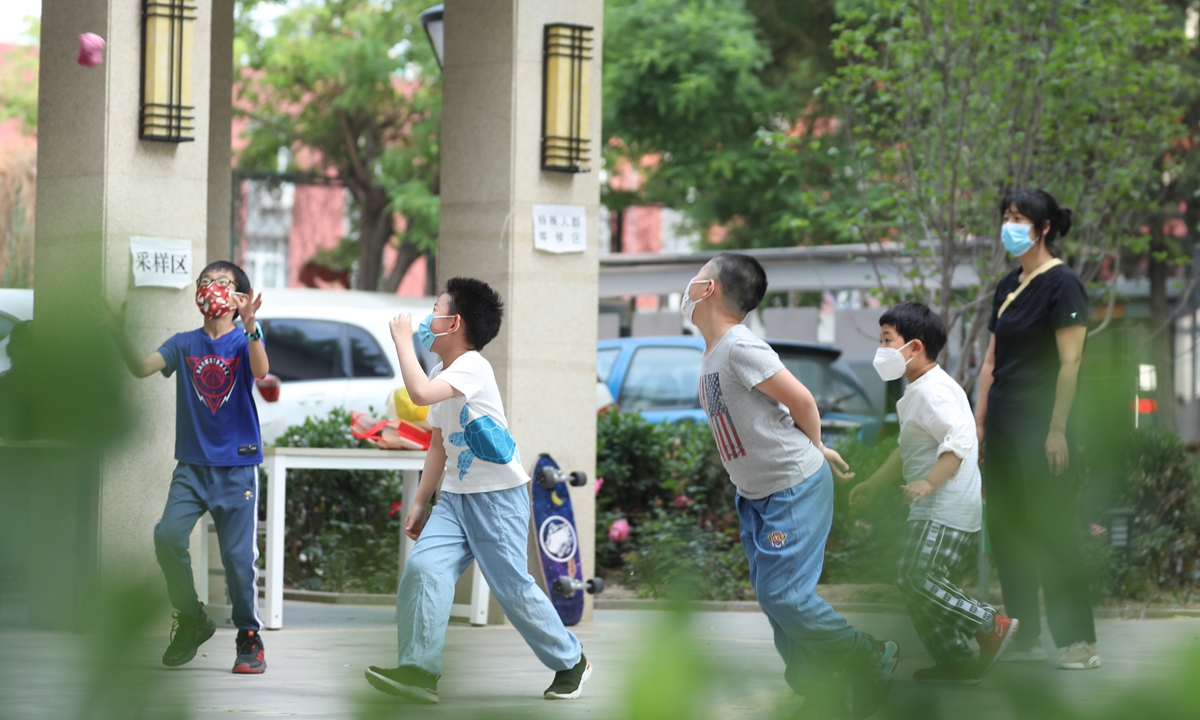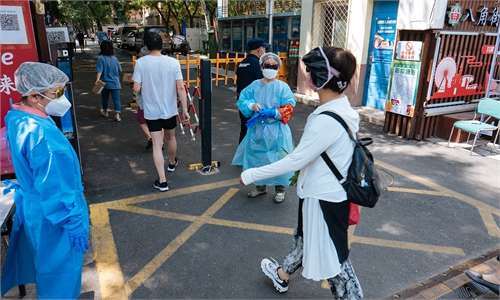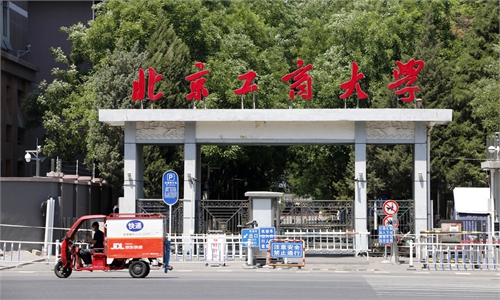Beijing's fight against Omicron still at a stalemate as city sees record number of new cases
More hope than challenges with potential drugs, increasing vaccination rate: expert

Children play inside a residential compound in Chaoyang district in Beijing after epidemic control restrictions were lifted on May 17, 2022. Photo: cnsphoto
One month after the latest COVID-19 resurgence began on April 22, Beijing's fight against Omicron is still at a stalemate with daily cases seeing a new peak on Sunday, despite strict measures including at least a dozen rounds of mass nucleic acid testing in three major districts.
Chinese Vice Premier Sun Chunlan inspected on Monday some places that reported a cluster infection in Beijing. She called for a faster response to eliminate infections outside controlled areas as soon as possible to secure people’s health and ensure their quality of life and work is in order, Xinhua News Agency reported.
Sun noted that the overall epidemic in Beijing is under control, but sporadic infections still occur. For that reason, the anti-epidemic work should not be slackened.
The capital city witnessed 63 infections from Sunday 3 pm to Monday 3 pm with residential communities further enhancing entry-exit management. While the overall epidemic in the country has been declining in the past week, health experts said it is still difficult to predict an inflection point for Beijing and believed that the outbreak may last until June.
But there is more hope than challenges, renowned Chinese epidemiologist Zhang Wenhong said, noting that more drugs are under research and development, and the vaccination rate is increasing. "We need more time and patience," he said.
A Chinese health official said at a press conference on Monday held by the joint prevention and control mechanism of the State Council, China's cabinet, that the overall number of daily new infections in the country had decreased to less than 1,200 in the past week, showing a declining tendency.
But the country still faces a severe and complex epidemic situation, the official said, vowing to put local outbreaks under control in the shortest time and at the lowest cost.
In the past month, the number of daily new infections in Beijing fluctuated around 50. But in a 24-hour period on Sunday, the number reached a single-day record high of 99 during this wave of the Omicron epidemic with 83 confirmed cases and 16 silent carriers, which virologists warned could be a signal that daily new infections in Beijing are likely to exceed 100 sooner or later.
It's much harder to detect new COVID-19 patients as the Omicron variant spreads fast and in a hidden way, and patients' symptoms are mild, which also causes difficulties in epidemiological investigation, a Beijing-based respiratory expert told the Global Times on Monday on condition of anonymity.
But there has been no significant increase in the number of new COVID-19 positive cases, which is the result of active prevention and control measures carried out in Beijing, indicating that the city's epidemic prevention strategy is effective, the expert said.
At the press conference on Monday, Beijing officials clarified requirements for those working from home, noting that these people should avoid moving, traveling or gathering.
Strict measures like working from home, banning dine-in services, suspending the operation of some busy subway stations and intensive mass nucleic acid testing have been implemented since late April, but Beijing is still struggling to eliminate Omicron infections as the city is trying to explore a method to curb the virus from spreading while not locking down the city.
In the past month, Haidian district conducted at least 16 rounds of mass nucleic acid testing, Chaoyang district 15 rounds and Fengtai district 13 rounds.
The Global Times learned that many residential communities in Chaoyang and Fengtai districts had enhanced management measures as of Monday, for example, banning deliverymen from entering and requiring residents to show entry-exit certificates, green codes on their Beijing health codes and negative nucleic acid testing results within 48 hours when entering the community.
Over 1,800 residents from a community in Haidian have been transferred to Zhangjiakou, North China's Hebei Province, one of the host cities of the 2022 Beijing Winter Olympics, for centralized quarantine as the community has reported multiple positive COVID-19 cases in the past few days.
There have been no COVID-19-related deaths reported in this wave in Beijing so far, which means that the positive patients detected were basically early cases and there was no sustained community transmission, the Beijing-based expert said, indicating that these groups are relatively young and have fewer underlying diseases.
Although agreeing that it is possible for the daily new infections in Beijing to increase, it is unlikely to see a large scale of transmission unless there are cluster outbreaks, because the city has carried out effective and timely preventive measures and the weather is becoming hot, which is not conducive to the spread of the virus, according to a Beijing-based immunologist who also required anonymity.
But there is space at the technical level to fight the Omicron variant. For example, more exploration can be conducted such as using antibody testing to understand the scope of the susceptible population.
New infections amid strict management measures also expose some potential problems in the anti-epidemic process, experts pointed out.
For example, there is the transmission risk of Omicron among people waiting on line for tests. Test personnel might fail to collect samples according to the standards and some residents did not cooperate with the testing requirement.
Amid uncertainty during the latest battle, Zhang Wenhong said at a forum on Sunday "We see challenges in the latest Omicron epidemic, but we should see more hope."
The ratio of silent virus carriers is increasing globally while that of severe cases is declining. This means the variant is not as challenging as we thought and attention should be given to protecting susceptible people, he explained.
The pandemic would not end in the short period. We need more time, more patience, more courage and more wisdom and technologies to overcome it, Zhang said.


